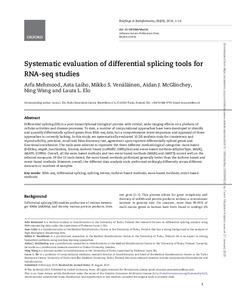Systematic evaluation of differential splicing tools for RNA-seq studies
Asta Laiho; Arfa Mehmood; Aidan J. McGlinchey; Ning Wang and Laura L. Elo; Mikko S. Venäläinen
Systematic evaluation of differential splicing tools for RNA-seq studies
Asta Laiho
Arfa Mehmood
Aidan J. McGlinchey
Ning Wang and Laura L. Elo
Mikko S. Venäläinen
Oxford University Press
Julkaisun pysyvä osoite on:
https://urn.fi/URN:NBN:fi-fe2021042822458
https://urn.fi/URN:NBN:fi-fe2021042822458
Tiivistelmä
Differential splicing (DS) is a post-transcriptional biological process with critical, wide-ranging effects on a plethora of cellular activities and disease processes. To date, a number of computational approaches have been developed to identify and quantify differentially spliced genes from RNA-seq data, but a comprehensive intercomparison and appraisal of these approaches is currently lacking. In this study, we systematically evaluated 10 DS analysis tools for consistency and reproducibility, precision, recall and false discovery rate, agreement upon reported differentially spliced genes and functional enrichment. The tools were selected to represent the three different methodological categories: exon-based (DEXSeq, edgeR, JunctionSeq, limma), isoform-based (cuffdiff2, DiffSplice) and event-based methods (dSpliceType, MAJIQ, rMATS, SUPPA). Overall, all the exon-based methods and two event-based methods (MAJIQ and rMATS) scored well on the selected measures. Of the 10 tools tested, the exon-based methods performed generally better than the isoform-based and event-based methods. However, overall, the different data analysis tools performed strikingly differently across different data sets or numbers of samples.
Kokoelmat
- Rinnakkaistallenteet [19207]
